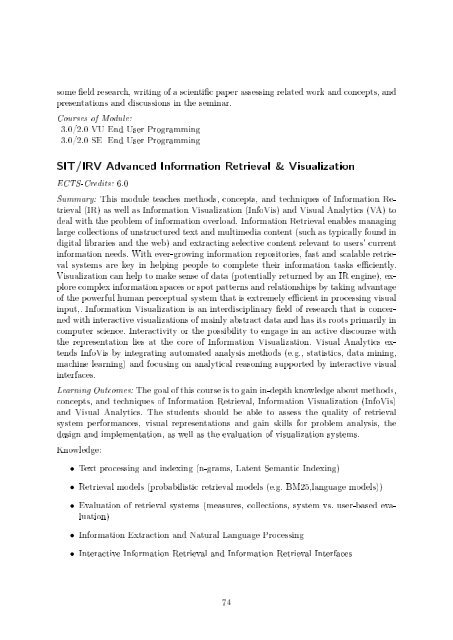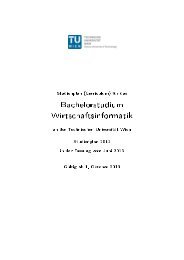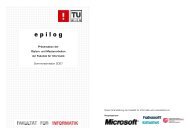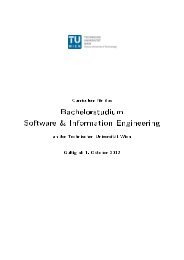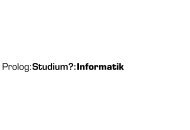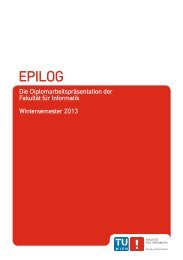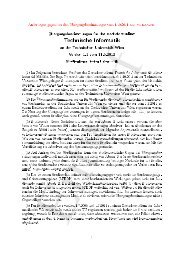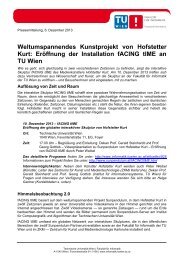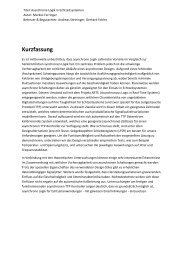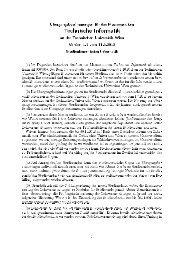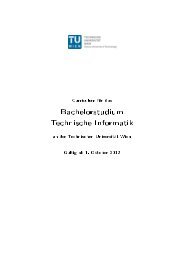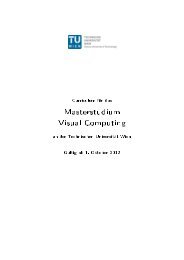Masterstudium Business Informatics - Fakultät für Informatik, TU Wien
Masterstudium Business Informatics - Fakultät für Informatik, TU Wien
Masterstudium Business Informatics - Fakultät für Informatik, TU Wien
You also want an ePaper? Increase the reach of your titles
YUMPU automatically turns print PDFs into web optimized ePapers that Google loves.
some eld research, writing of a scientic paper assessing related work and concepts, and<br />
presentations and discussions in the seminar.<br />
Courses of Module:<br />
3.0/2.0 VU End User Programming<br />
3.0/2.0 SE End User Programming<br />
SIT/IRV Advanced Information Retrieval & Visualization<br />
ECTS-Credits: 6.0<br />
Summary: This module teaches methods, concepts, and techniques of Information Retrieval<br />
(IR) as well as Information Visualization (InfoVis) and Visual Analytics (VA) to<br />
deal with the problem of information overload. Information Retrieval enables managing<br />
large collections of unstructured text and multimedia content (such as typically found in<br />
digital libraries and the web) and extracting selective content relevant to users' current<br />
information needs. With ever-growing information repositories, fast and scalable retrieval<br />
systems are key in helping people to complete their information tasks eciently.<br />
Visualization can help to make sense of data (potentially returned by an IR engine), explore<br />
complex information spaces or spot patterns and relationships by taking advantage<br />
of the powerful human perceptual system that is extremely ecient in processing visual<br />
input,. Information Visualization is an interdisciplinary eld of research that is concerned<br />
with interactive visualizations of mainly abstract data and has its roots primarily in<br />
computer science. Interactivity or the possibility to engage in an active discourse with<br />
the representation lies at the core of Information Visualization. Visual Analytics extends<br />
InfoVis by integrating automated analysis methods (e.g., statistics, data mining,<br />
machine learning) and focusing on analytical reasoning supported by interactive visual<br />
interfaces.<br />
Learning Outcomes: The goal of this course is to gain in-depth knowledge about methods,<br />
concepts, and techniques of Information Retrieval, Information Visualization (InfoVis)<br />
and Visual Analytics. The students should be able to assess the quality of retrieval<br />
system performances, visual representations and gain skills for problem analysis, the<br />
design and implementation, as well as the evaluation of visualization systems.<br />
Knowledge:<br />
• Text processing and indexing (n-grams, Latent Semantic Indexing)<br />
• Retrieval models (probabilistic retrieval models (e.g. BM25,language models))<br />
• Evaluation of retrieval systems (measures, collections, system vs. user-based evaluation)<br />
• Information Extraction and Natural Language Processing<br />
• Interactive Information Retrieval and Information Retrieval Interfaces<br />
74


